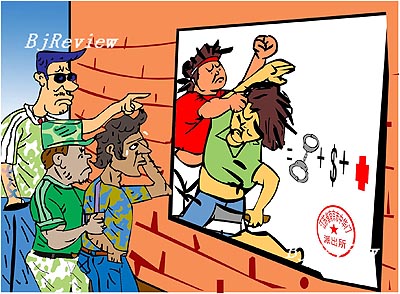|

If you're thinking of slapping someone in public, not only do you have anger issues to deal with, but now you could be on the receiving end of a hefty fine. In a bid to clamp down on public violence, a growing number of grassroots police authorities around China are experimenting with a new fistfight prevention policy.
Simply put, the core of the policy is to compile a so-called "fistfight cost sheet," which lists the specific punishment for those who involve themselves in fistfights as opposed to previous relevant statutes, such as the Law on Administrative Penalty, which are vague.
Police are hoping this initiative will help to curb public violence due to its financial deterrent.
For example, according to a leaflet distributed by the Zhonghuamen Police Station in Nanjing, east China's Jiangsu Province, a fistfight may cost its instigator an average of 10 days' detention, 500-yuan fine and 1,000 yuan of medical care expenses for the injured party. The calculations were based on local police officers' previous dealings with cases of this kind. Official statistics, however, show that urban Jiangsu residents' per-capita annual income stood at 14,084 yuan in 2006, meaning this punishment was a substantial amount.
This simply explained leaflet is designed to remind people to think before they act, said a Zhonghuamen police spokesperson, and that striking out in anger is not the way to resolve disputes.
It seems the police's efforts have paid off. Yancheng, a city of 8 million in Jiangsu Province, witnessed a 10-percent plunge in the number of fistfight cases reported after the local police issued 3,000 pamphlets explaining the penalties of public violence.
Central China's Henan Province also attributed its falling incidence rate of 10 types of preventable crimes, which dropped 36.3 percent in 2006 over the previous year, to the adoption of intervention measures including the publication of fistfight penalties.
However, people are split on the effect of the new scheme. Though the publicized penalties imposed on fistfight participants sound stringent, skeptics insist that they are just formalities, which will have little of no effect on people who fly off the handle.
The opposition, however, while admitting that one size may not fit all, especially when it comes to crime precaution, places more emphasis on the already evident positive side of this initiative. To them, the role of the police in mediating disputes and resolving conflicts is not weakened or replaced by these penalties, which helps to simplify the effect their actions will have on people unfamiliar with relevant laws.
The new approach also arouses concerns that the rich can resort to violence at will, but not the poor. While a few thousand yuan in fines and compensation to victims is not big enough to discourage the wealthy from fighting, it may force the poor to endure infringements on their legal rights without resistance.
A pointless idea
Xiao Rui (The Beijing News): The announcement of quantitative penalties for fistfights in public is too simple. Addressing specific cases calls for professional analysis in line with related laws, beyond the reach of such measures as detentions or fines.
Some Guangdong police even indicated that a person's participation in street scuffles might even ruin their children's eligibility to join the army or enter police academies. But, this statement cannot find any supporting stipulations in relevant laws. Any group of Chinese people, no matter how poorly they are acquainted with the law, should not be burdened with law violation costs. The law enforcement authorities are not entitled to random interpretations of the law to the public, because the public's legal awareness cannot be nurtured by threats.
For a society ruled by law, misinterpretations of legal stipulations are as detrimental as criminal cases. Worse still, the general public may fall victim to the practice, being deprived of justice and the chance to examine laws more thoroughly.
Lin Jinfang (Shanxi Evening News): It's nothing new that fistfights should be sanctioned. Educational effects of the so-called "fistfight cost sheet" are no different from showing criminals on TV or in newspapers, except for its innovative use of the concept of cost.
From the perspective of the economics of crime, one's determination to disobey the law hinges not only on the severity but also on the certainty of the punishment. In my opinion, publishing the penalties for fistfights is far from instrumental in shrinking criminal cases. The pivotal solution lies in more severe penalties and improvement in the efficiency and fairness of law enforcement.
Hai Jingyuan (sohu.com): This new initiative is certainly well-intended. However, I have to say it lacks a deep understanding of the cause-and-effect relationship between one's behavior and character.
Resorting to violence arises from particular external elements, like the sudden impulse to show off, eagerness to vent one's anger or the urgent need to save face. Mild and gentle people will voluntarily avoid fighting, while those quick to anger will fight at the mere spark of disagreement, despite the possibility of paying a fine.
| 